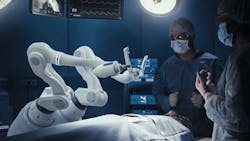Surgical robots watch, learn, and perfect procedures, but will they cut your healthcare costs?
It’s that time again. A time for trading in your short-sleeved shirts for cozy, cable-knit sweaters. A time for raking leaves and sipping warm spiced tea. And, most importantly, it’s a time when families across this great country come together to reflect on the year, ask the tough questions, and make plans for a better life in 2025. No, I’m not talking about the holidays. I’m talking about open enrollment. If you’re like me, then you’re probably perplexed by all the choices and options. With this new provider, will my doctors still be in network? Does it make financial sense to try the HSA plan, or should I stick with my trusty PPO? If I need to have a medical procedure, will it be covered? Luckily, science might have the answer to your enrollment dilemma. In the not-too-distant future, you might be asking your HR department if you can save money by having your upcoming surgery performed entirely by robots.
Researchers at Johns Hopkins University are utilizing imitation learning and machine learning to train a new generation of surgical robots. For their research, the team used a da Vinci Surgical System robot and taught it basic surgical tasks, including manipulating a needle, lifting body tissue, and suturing. According to the university, the robot learns various surgical techniques by watching hundreds of videos of experienced surgeons from around the world performing various procedures. To obtain the footage for training, the researchers placed wrist cameras on the arms of da Vinci robots during surgical procedures conducted by humans.
After watching the videos, the robot is able to replicate the surgeon’s movements, often more skillfully than their human counterpart. Despite the robot’s reputation of being imprecise, the team trained the model to perform relative movements rather than absolute actions. The researchers hope that technological steps like this will ultimately enable robots to perform complex surgeries with true autonomy.
In a recent quote, Axel Krieger, an assistant professor in Johns Hopkins’ Department of Mechanical Engineering, said, “The model is so good learning things we haven't taught it. Like if it drops the needle, it will automatically pick it up and continue. This isn't something I taught it do."
Ji Woong "Brian" Kim, a postdoctoral researcher at Johns Hopkins, added, "All we need is image input and then this AI system finds the right action. We find that even with a few hundred demos, the model is able to learn the procedure and generalize new environments it hasn't encountered."
About the Author
Alexis Gajewski
Senior Content Strategist
Alexis Gajewski has over 15 years of experience in the maintenance, reliability, operations, and manufacturing space. She joined Plant Services in 2008 and works to bring readers the news, insight, and information they need to make the right decisions for their plants. Alexis also authors “The Lighter Side of Manufacturing,” a blog that highlights the fun and innovative advances in the industrial sector.
